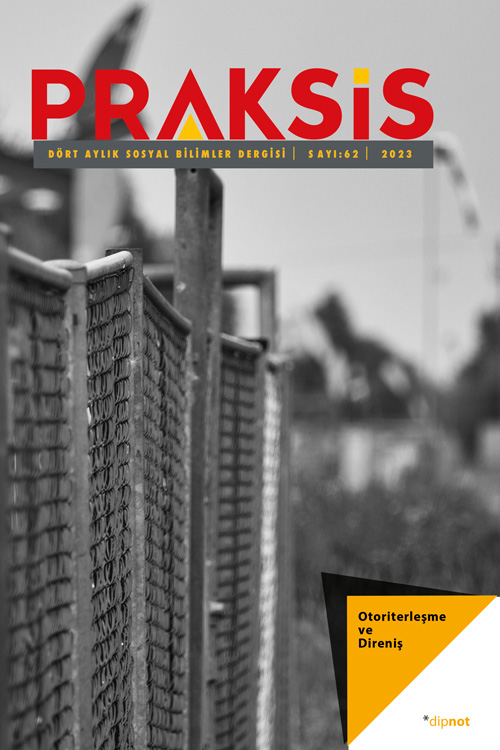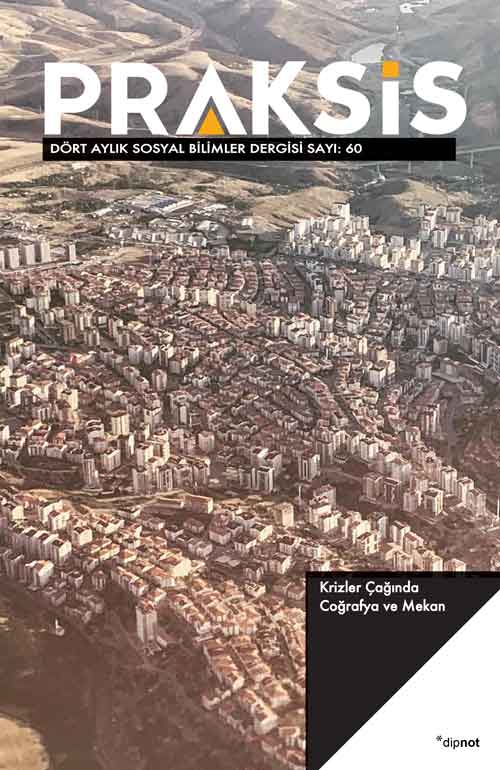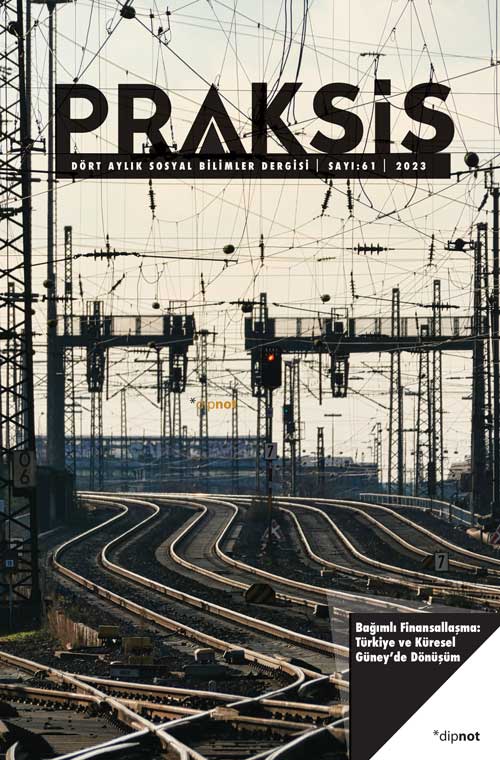Historical Materialism Istanbul 2022 Conference Special Issue
The ‘Non-Present Presence’ of Law: Analysis of the “Deconstitutionalization” Conjuncture in Turkey
Muharrem Enes Kaya
This study examines the phenomenon of Deconstitutionalization in Turkey within the conceptual framework of Conjunctural Marxism and with the methodological tools of Conjunctural Analysis developed by the Cultural Studies. By conceptualizing law as a form-determined condensation of power relations, this study addresses the function of law in organizing and limiting political power, and emphasizes the importance of its qualitative transformation corresponding to a hegemonic instability for the emergence and institutionalization of an exceptional regime. Considering the current conjuncture in Turkey, it analyzes the impact of deconstitutionalization on regime change
Keywords: Conjunctural Marxism, conjunctural analysis, deconstitutionalization, hegemony
Working Class Actions Under Authoritarian Conditions: The Case of Post-2015 Turkey
Alpkan Birelma, Ebru Işıklı ve Deniz Sert
Turkey has been in the process of deepening authoritarianism since the beginning of the 2010s. Although some specific political factors have fed the process, the recent authoritarianization can be read as the strengthening of authoritarianism inherent in capitalism in the face of economic stagnation. According to the literature, authoritarianism reduces the number of protests. This study examines the working-class protests in Turkey by scanning newspapers since 2015, and its findings confirm this statement. From 2015 to 2020, a general downward trend was observed in the number of working-class protest cases and participants. Protests in 2021 and the first two months of 2022, however, reversed the downward trend and recorded a significant increase. Four factors account for this increase. The first is the ever-increasing high inflation from 2021 to 2022. The second factor was that the AKP had to be relatively tolerant of the growing protests during this period. The upcoming elections and the AKP’s loss of support in the polls due to inflation served as a political opportunity for the labour movement. The third factor was the pandemic. The deterioration of working conditions in many workplaces during the pandemic and the increased structural power of workers such as couriers and health workers created growing tension, which became visible in 2021 and the first months of 2022. The final factor is the contribution of socialist/militant independent trade unionism, particularly during the strike wave in early 2022. The data presented in the article show that the working class of Turkey, under the dual pressure of authoritarianism and neoliberalism for more than forty years, put up a remarkable struggle. It is possible to foresee that working-class protests will increase significantly if there is relative democratisation in the country.
Keywords: Industrial relations, sociology of work, strikes, labour unions, social movements.
Virus as a Catalyst: Struggles for Hegemony in Turkey
Alp Kayserilioğlu
The Coronavirus Pandemic in Turkey has intensified an already existing hegemonic crisis of the AKP-led regime. In this process dating back to June 2013, AKP could retain its leading political position by shifting alliances and opting for an authoritarian offensive and a new nationalist consensus. However, political stability was not achieved. The municipal elections in 2019 and especially the re-run in Istanbul have shown that a massive popular shift in consent is taking place and could radicalize. In what follows, an analysis of the AKP era and of the hegemonic crisis since 2013 will be given. The ensuing process of authoritarian consolidation and its crisis will be analyzed with specific focus on the municipal elections of 2019 and the Coronavirus pandemic (2020-22). It will be argued that this process and its aggravation through 2019-22 led to a gradual erosion of neoliberal economic policies by the AKP for the sake of short-term political and, for certain capital factions, economic survival. On the other hand, the political system has turned ever more polycratic and decisionistic. It will be concluded that whereas social opposition to neoliberal erosion and authoritarian consolidation remains strong, it is atomized, while the main bourgeois opposition bloc aims to pacify the potentials of the social opposition in order to ensure a controlled restoration of neoliberalism with tamed elements of authoritarianism.
Keywords: authoritarian consolidation, neoliberal erosion, struggles for hegemony, decisionism, polycracy, social opposition.
Old Struggle, New Conflict An Evaluation On The Istanbul Taxi Crisis
Müge Neda Altınoklu
After the 2019 local elections, a conflict line regarding inner-city transportation emerged in Istanbul. The taxi crisis, being the extension of historical social struggles in urban transportation in specific and current conditions, had a different meaning within the framework of the changing nature of the state-society relationship during the Justice and Development Party (AKP) era. As a professional organization, the Istanbul Taxi Drivers’ Chamber (ITEO) played an important role in escalating the aforementioned crisis through the maintenance of its alliances within the changing balance of power. In addition to the protest of the taxi owners and drivers against the Istanbul Metropolitan Municipality (IBB) in 2022, discourses and ideological positioning adopted by the chamber showed the importance of the role played by taxi owners in the reproduction of the AKP’s multidimensional hegemony project. This article aims to make an assessment of the legitimizing role of taxi owners through the structure and functioning of their interest representation, their motivation to participate in the hegemonic struggle, and their role in decision-making processes. Dealing with the state projects regulating the capital accumulation process in taxi transportation on the axis of conflicts and reconciliations, it will be concluded that the current taxi crisis is not independent of private property relations, but more importantly, the ideological restructuring of the market conditions shaped by legal and institutional interventions regarding taxi transportation during the AKP period. In the article, by referring to main discussions on the history of urban transportation in Istanbul, and in addition to several interviews carried out with taxi owners, drivers and chamber managers, the archives of national newspapers and professional journals were used to understand the historical material conditions of conflicting interests of the taxi drivers and owners.
Keywords: Istanbul taxi crisis, AKP, IBB, Istanbul Chamber of Taxi Drivers, class analysis, property relations.
“The Pandemic is a Problem of Social Order”: Police Practices in Western Europe in the Covid-19 Era
Taşkın Toprak İpek
The Covid-19 pandemic has shaken the world with its socio-political aspects as much as it is a biological threat. The pandemic has increased global inequality and redistribution problems, and the police force, the most important security institution, has been used more intensively by governments to stabilize and suppress the deteriorating social structure. During this suppression, the police rely on four core principles: private property, order, security and pacification. This study argues that during the covid-19 pandemic, the police used these principles to discipline the middle and lower social classes, the urban poor and ethnic minorities. Based on qualitative content analysis, the study examines police power in Western Europe, which is seen as the heart of liberal democracy. As a result, it is argued that police practices victimize and target subaltern classes.
Keywords: Police, neoliberalism, security, Covid-19 pandemic, Western Europe.
The Pakistani Community in Greece and Its Contribution to the Antifascist Struggle against Golden Dawn during the 2010s
Costas Gousis
Translation from English: Ecehan Balta
The trial of Golden Dawn has been described as the biggest trial of a fascist criminal organisation since the Nuremberg trials. The victory against Golden Dawn is a huge political and legal achievement, belonging to the civil action lawyers, the victims’ families, the trade unionists, and the immigrant communities, as part the broader antifascist movement that had confronted Golden Dawn during the previous years. Contributing to the understanding of the role of the immigrant communities in the antifascist movement, this paper explores how the Pakistani Community of Greece “Unity” reorganised its activities to meet the new challenges related to the rise of racism and the fascist threat during the 2010s.
Cautious to discern forms of authoritarian statism from fascism, I argue that patterns of xenophobia followed by the Greek state created favourable terrain for Golden Dawn and raise questions about Pakistani immigrant workers’ political and legal subjectivity related to the contribution of “Unity” to the antifascist movement. With a special focus on leadership and alliances, four central pillars of the Pakistani Community’s antifascist strategy are specifically examined: class unity, motivation, visibility in the public sphere, and strategic litigation. To identify strategic moves on the part of the Pakistani Community, I detail two notable migrant-led protest events during the summer of 2012 and shed light on the dialectics between street politics and legal–administrative responses to the fascist threat, illustrated by the justice campaign following the murder of Pakistani worker Shehzad Luqman by Golden Dawn members.
Keywords: Pakistani community, Greek crisis, antifascism, immigrant activism, strategic litigation.
After Golden Dawn: The spread and transformation of the far right in Greece
Rosa Vasilaki & George Souvlis
Translation from English: Kasım AKBAŞ
The existing literature on the contemporary far right in Greece has so far limited its focus on the Golden Dawn’s parliamentary and extra-parliamentary activity and discourse leaving aside how its rhetoric and practices were diffused to the social body and were adopted by other political actors during the period of its legal existence and after its conviction. Our paper aims to bridge this research gap by examining the ways through which key ideological motifs were adopted and articulated by actors originating both in the realms of the state and civil society. More precisely, we focus on the formation of discursive patters resembling those employed by the Golden Dawn developed by and organizations, key media broadcasters and newspapers, officers of the armed forces and priests of the Greek orthodox church after the conviction of the Nazi Party in October 2020, as well as feminist and LGBTQI actors. We argue and demonstrate that far from being an exceptional discourse confined to the supporters and members of the Golden Dawn, this ideology has been diffused to wider strata of the Greek society and more precisely by the institutions under examination, even if it has been defined and mediated by the occupational/professional and political lens of each institution under examination. To substantiate our endeavour, we have recourse mainly to qualitative (in-depth interviews) data, but also to quantitative (statistical documentation), which are conducive to a more solid interpretation of the social phenomena under investigation, and more nuanced conceptualizations of the relation between Golden Dawn and other keys institutions of the contemporary Greek society. The data and sources used for this paper are drawn from the volume “Mainstreaming the Far Right in Greece: Gender, Media, Armed Forces and the Church” which was co-edited by the authors and published by the Rosa Luxemburg Stiftung-Greece Office in 2021.
Keywords: Greece, Far-right, Golden Dawn, Civil Society, Political Actors.
Book Review
Avrupa ve Tarihsiz Halklar
Baran Şahinli




